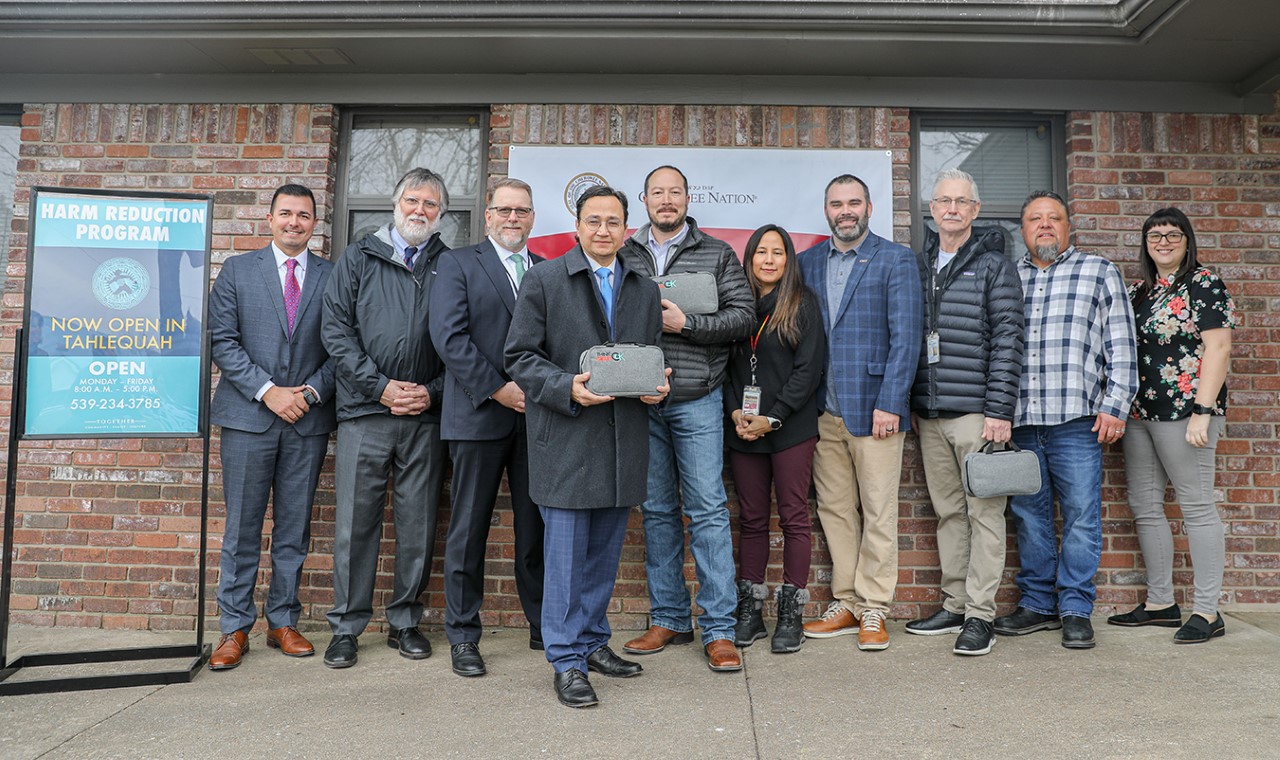TAHLEQUAH, Okla. – The Cherokee Nation is taking more innovative steps to address the opioid epidemic across the Cherokee Nation Reservation, opening the new Cherokee Nation Harm Reduction Program in Tahlequah.
The Cherokee Nation was the first tribe in the country to receive a Substance Abuse and Mental Health Services Administration grant specifically to start a harm-reduction program that offers syringe services to reduce drug use and keep tribal citizens healthier by preventing the transmission of blood-borne infections.
Through Cherokee Nation Principal Chief Chuck Hoskin Jr. and Deputy Principal Chief Bryan Warner’s Public Health and Wellness Fund Act and the competitive grant, about $3 million has been set aside to open the harm-reduction facility.
For over a year, Cherokee Nation leaders have studied and toured effective harm-reduction programs on tribal lands in Washington and North Carolina, which are lowering Hepatitis C incidence rates, reducing drug overdoses and supporting public safety.
“In our Cherokee culture, we work together as a community for all our fellow citizens in need. We should not fail to acknowledge the impact that addiction has. We can help our fellow citizens improve health outcomes and help with healing from opioids and other drugs that have impacted our tribe and families,” Chief Hoskin said. “This new harm-reduction program, in addition to the range of other recovery-oriented programs within Behavioral Health that we have started expanding, can address the complexities of drug addiction among our Native people and provide meaningful resources that can having a lasting impact.”
Cherokee Nation makes up less than 6% of Oklahoma’s population, yet nearly a third of the opioids distributed in the state in recent years went into Cherokee Nation communities, causing generational health issues and vast trauma.
The state of Oklahoma also has one of the highest Hepatitis C virus prevalence rates in the U.S. with 56%, due to injection drug use according to the Centers for Disease Control and Prevention.
Cherokee Nation was among 22 programs and the only tribe among more than 440 applicants to receive a SAMHSA grant last year for a harm-reduction syringe services program.
“We are so fortunate to have been awarded the SAMHSA Harm Reduction Grant, the first of its kind which will allow us to provide a holistic continuum of care for Native Americans and any member of the public suffering from substance use disorders,” Cherokee Nation Behavioral Health Senior Director Juli Skinner said.
The Cherokee Nation Harm Reduction Program at 214 N. Bliss Avenue in Tahlequah is now open from 8 a.m. to 5 p.m. Monday through Friday to tribal citizens and the public in need. It will provide sterile syringes to participants, who can remain anonymous.
Clients can bring in previously used syringes for safe disposal to get sterile syringes. Clients can also receive Fentanyl test strips, Narcan nasal spray, HIV and Hep C virus rapid testing, recovery support, referrals and basic clothing and hygiene kits at the clinic.
Harm-reduction syringe services programs do not increase illegal drug use or crime rates, but instead reduce the spread of viral hepatitis and HIV, according to the CDC.
“I have been working on the Cherokee Nation Hepatitis C Virus elimination program for seven years and have learned that without harm reduction it is impossible to eliminate HCV. When I was told that the Cherokee Nation was developing a harm-reduction syringe services program, I saw the light at the end of the tunnel. Maybe now we can really eliminate HCV from our communities,” Director of Infectious Diseases Dr. Jorge Mera said.
The program can also benefit first responders and the public by providing safe needle disposal and reducing the presence of discarded needles in the community, thereby reducing accidental disease transmissions.
“Cherokee Nation holds all our citizens sacred,” Deputy Chief Warner said. “Our citizens, Natives within our Reservation and any member of the public that needs this service can now walk in and seek and receive services without experiencing any stigma associated with mental health and addiction.”
Behavioral Health also offers medication-assisted treatment, community education, Narcan distribution, detox, and inpatient referrals to address substance use. Participants in the Cherokee Nation Harm Reduction Program will have access to behavioral health resources and can be transitioned to treatment if they choose.
Under Chief Hoskin and Deputy Chief Warner’s Public Health and Wellness Act, millions in funds will help construct drug treatment facilities in the Cherokee Nation. The tribe will also develop long-term plans for a comprehensive behavioral health system that features transitional living and expanded in-patient and out-patient services and build more wellness centers across the reservation.
For more information on the Cherokee Nation Harm Reduction Program, call 539-234-3785; or for other Cherokee Nation Behavioral Health needs, call 539-234-3500.

